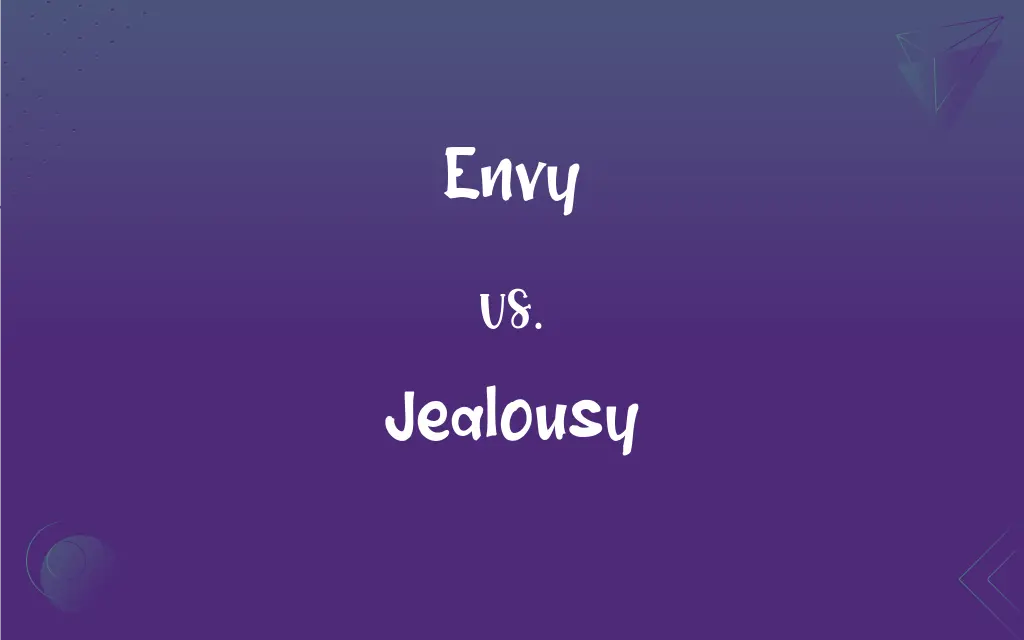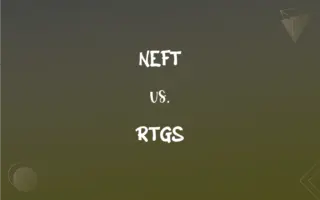Envy vs. Jealousy: What's the Difference?
Edited by Janet White || By Harlon Moss || Updated on October 24, 2023
Envy is a longing for someone else's possessions or qualities, while jealousy involves fear of losing something to someone else.

Key Differences
Envy and jealousy, while often used interchangeably, denote different emotions. Envy arises when we lack a desired attribute or possession that another person has, leading to feelings of inferiority or longing. In contrast, jealousy stems from the fear of losing something we have, like a relationship or position, to another.
Envy typically concerns two parties: the one who envies and the one being envied. For instance, one might envy a friend's success or talent. Jealousy, however, often involves three entities: the one feeling jealous, the one perceived as a threat, and the object of affection or value.
While envy can lead to feelings of admiration or inspiration, pushing someone to improve or achieve, it can also foster resentment or bitterness. Jealousy, on its part, can incite possessiveness, anxiety, or even aggressive behavior, driven by the fear of loss.
In literary and cultural contexts, envy is sometimes represented as a green-eyed monster, symbolizing the covetous desire. Jealousy, although also depicted as green-eyed occasionally, leans more towards guarding what one already possesses rather than wanting what someone else has.
Envy can be passive, merely a wish to have what someone else possesses. Jealousy, being rooted in fear, can be more intense and proactive, often leading to actions to prevent the perceived threat from taking what's "ours."
ADVERTISEMENT
Comparison Chart
Basis
Longing for what others have.
Fear of losing what one possesses.
Number of parties involved
Typically two.
Often three.
Emotion
Desire or covetousness.
Possessiveness or fear.
Potential feelings
Admiration, resentment.
Anxiety, protectiveness.
Action-driven
Might inspire self-improvement.
Often leads to protective or preventive measures.
ADVERTISEMENT
Envy and Jealousy Definitions
Envy
Envy is a feeling of discontented desire for someone else's advantages.
She felt a twinge of envy at her sister's success.
Jealousy
Jealousy is a vigilant guarding of a possession or right.
His jealousy over his position was evident.
Envy
Envy can be a begrudging admiration.
She couldn't hide her envy of their close friendship.
Jealousy
Jealousy denotes a feeling of resentment against someone because of their success or advantages.
Jealousy prevented her from being happy for others.
Envy
Envy is a longing for another's possessions or attributes.
His new car was the envy of the neighborhood.
Jealousy
Jealousy is a fear or resentment of possible rivalry in love or affection.
Jealousy flared when she saw him talking to her best friend.
Envy
Envy involves resentful coveting of another's advantages.
Envy consumed him when he saw her achievements.
Jealousy
Jealousy involves a mistrustful or envious attitude.
His constant jealousy made the relationship challenging.
Envy
Envy signifies a feeling of inferiority in comparison to another.
His intellect was the subject of much envy.
Jealousy
Jealousy is an apprehensive unease about potential loss or deprivation.
Jealousy crept in as he noticed her growing distant.
Envy
A feeling of discontent and resentment aroused by and in conjunction with desire for the possessions or qualities of another. See Usage Note at jealous.
Jealousy
A jealous attitude or disposition. See Usage Note at jealous.
FAQs
What is envy?
Envy is a longing for someone else's possessions or qualities.
Can envy be a positive emotion?
Envy can inspire self-improvement, but it can also lead to resentment.
Can jealousy be harmful?
Yes, if unchecked, jealousy can lead to possessive or even aggressive behavior.
Is envy always negative?
No, it can be a catalyst for personal growth, but it can also foster bitterness.
What's the difference between envy and admiration?
Envy involves wanting what someone else has, while admiration respects their qualities without the desire to possess them.
Can envy be felt towards an enemy?
Yes, one can envy attributes or possessions of even those they dislike.
Is jealousy always related to relationships?
No, jealousy can relate to any possession or status, not just relationships.
Can jealousy be felt in friendships?
Yes, it can arise in any relationship or scenario where there's something to lose.
Is jealousy a sign of love?
Not necessarily; it can be, but it's often a sign of insecurity.
Can someone be envious without showing it?
Yes, envy can be an internal feeling not always externally displayed.
Are envy and jealousy the same?
No, while related, they denote different emotions and scenarios.
Can envy be based on admiration?
Yes, envy can stem from begrudging admiration for someone.
Is jealousy linked to trust issues?
Often, yes. Mistrust can fuel feelings of jealousy.
How is jealousy defined?
Jealousy involves fear or resentment of losing something or someone to a rival.
What's the root emotion of envy?
The root emotion of envy is desire or covetousness.
Is it natural to feel envy or jealousy?
Yes, they are natural emotions but should be managed constructively.
And for jealousy?
The root emotion of jealousy is fear or possessiveness.
How is envy depicted in literature?
Often as a green-eyed monster symbolizing covetous desire.
What causes envy?
Comparison, perceived inferiority, or unmet desires can lead to envy.
How can one combat jealousy?
By building trust, improving self-esteem, and addressing insecurities.
About Author
Written by
Harlon MossHarlon is a seasoned quality moderator and accomplished content writer for Difference Wiki. An alumnus of the prestigious University of California, he earned his degree in Computer Science. Leveraging his academic background, Harlon brings a meticulous and informed perspective to his work, ensuring content accuracy and excellence.
Edited by
Janet WhiteJanet White has been an esteemed writer and blogger for Difference Wiki. Holding a Master's degree in Science and Medical Journalism from the prestigious Boston University, she has consistently demonstrated her expertise and passion for her field. When she's not immersed in her work, Janet relishes her time exercising, delving into a good book, and cherishing moments with friends and family.































































